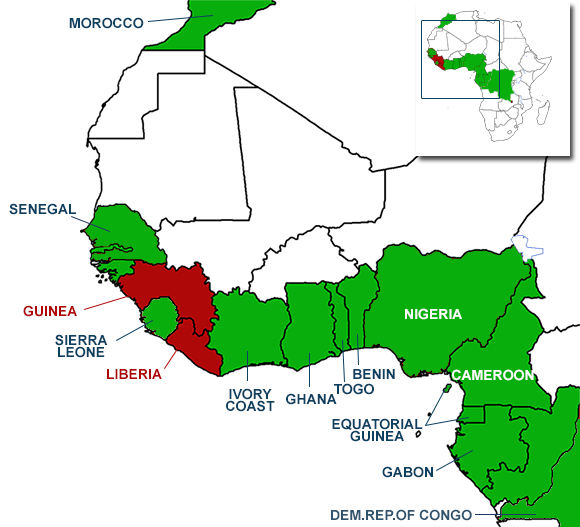
 |
EBOLA or EVD (Ebola Virus Disease) is a lethal hemorrhagic fever which transmits from nonhuman primates to humans and from humans to humans. Infection occurs from direct contact through broken skin or mucous membranes with the blood, or other bodily fluids or secretions (stool, urine, saliva, semen) of infected people. Infection can also occur if broken skin or mucous membranes of a healthy person come into contact with environments that have become contaminated with an Ebola patient’s infectious fluids such as soiled clothing, bed linen, or used needles. The incubation period from time of infection to symptoms is 2 to 21 days (hence the 21-days quarantine some countries have instated for vessels arriving from infected countries). for more information, please refer to the World Health Organization's Ebola F.A.Q.. |
 |
Early-stage common symptoms are fever, muscle pain, headaches, dizziness & tiredness and nausea (all unfortunately quite common to most flu syndromes and to Malaria). Following symptoms are vomiting, diarrhea, coughing (all possibly with blood) and nose or mouth bleeding. It is important to note that a person who is infected is only able to spread the virus to others after the infected person has started to have symptoms. In case of suspicion of contamination of one of your crew members, please refer to the Annex of the IMO's Circular Letter nb.3483 for guidance on measures to be taken onboard. Full version of the Circular is otherwise available here |
 |
The following list is a non-exhaustive gathering of various recommendations currently being made to sea farers onboard vessels calling in the infected countries: - wear disposable masks and gloves when on duty on deck - respect normal basic hygiene measures and wash your hands frequently, if possible with sanitizer. - refrain from purchasing/consuming meat from local forest animals (monkeys, bats, porcupines, agouti and all other kinds of local rodents). - it is deemed preferable at this stage if crew members remain onboard their ships for the duration of the calls unless absolute necessity. - prolonged direct physical contact between crew and shore personnel should be avoided as much as reasonably possible (avoid hand shakes for instance) - movements of shore personnel boarding vessels should be restricted to a bare minimum: anyone without a direct purpose to board vessel and without proper protection -mask & gloves) should not be allowed onboard |


 BENIN
BENIN CAMEROON
CAMEROON CONGO (Dem.Rep.)
CONGO (Dem.Rep.) EQUAT.GUINEA
EQUAT.GUINEA GABON
GABON GHANA
GHANA GUINEA (Conakry)
GUINEA (Conakry) IVORY COAST
IVORY COAST LIBERIA
LIBERIA MOROCCO
MOROCCO NIGERIA
NIGERIA SENEGAL
SENEGAL SIERRA LEONE
SIERRA LEONE TOGO
TOGO FRANCE
FRANCE